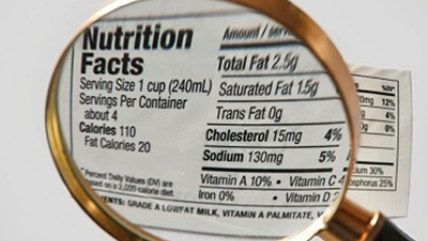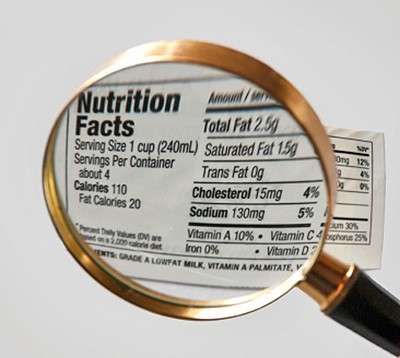Making the Case for Food Freedom and Free Speech
A series of important food lawsuits are fighting unconstitutional restrictions on free speech.


During a week in which we learned that dozens of Yale University students had signed a petition to repeal the First Amendment—which, after all, protects the freedom to petition, among other fundamental rights—it's no surprise that the state of free speech in America is, like many Americans, in rough shape.
That fact is no more evident than in several cases, in cities and states across the country, in which rules that apply to food have been used to stifle free speech.
Some of these laws compel speech. Others prohibit it. Still others do both.
This summer, for example, the American Beverage Association filed a lawsuit against San Francisco, as I described here and here, arguing that the city's bizarre new law targeting soda marketing compels some speech and prohibits other speech, both in violation of the First Amendment. That lawsuit is ongoing.
More recently, the National Restaurant Association (NRA) challenged New York City's awful new salt-labeling rules. The NRA's challenge was as predictable at is welcome. This summer, after the city's health department proposed the rules, the NRA submitted comments to the department on the proposed rules that referred to them as arbitrary and capricious and said the rules "violate[] the separation of powers doctrine, and would compel speech in violation of the First Amendment."
In the lawsuit, filed earlier this month, the NRA correctly likens the salt rules to the short-lived and controversial soda ban that went into effect under former mayor Michael Bloomberg and which the state's highest court overturned on grounds very similar to those on which the present suit was filed. The NRA says the health department "has required the disclosure of just enough inaccurate and controversial information about sodium in certain food items to cause far reaching negative consequences rather than help consumers and reduce public health risks."
Earlier this year, I sat on a panel at Seattle University Law School called "Re-Tooling Speech: What You Can Say about Your Food." Two of the ongoing cases I spoke about in Seattle—one a challenge to Vermont's mandatory GMO-labeling law, the other fighting to overturn Idaho's awful ag-gag law—are currently winding through federal court.
The former, filed by the Grocery Manufacturers Association, has yet to be decided. The State of Idaho just this month decided to appeal an August ruling that struck down its ag-gag law as violative of the First Amendment. That suit was filed by PETA and other animal-rights supporters.
While this string of assaults on free speech says at least as much about the state of the First Amendment in America today as does the petition and video from Yale, it also underscores a couple more hopeful notes. First, I believe each of these cases will ultimately prevail in favor of protecting free speech. Second, there's the very simple fact that in each case I've described where a state or local government violated the First Amendment rights of food makers (or, in the case of animal-rights supporters, of food activists), the victims of unconstitutional laws have sued to defend their rights. When large groups like the Grocery Manufacturers Association, American Beverage Association, PETA, and the National Restaurant Association sue to protect First Amendment violations, they're defending rights enjoyed by every American. When they win, we all win.
At the Seattle conference, I stressed how many food cases are helping to reshape the scope of traditional First Amendment law, and how those cases could in turn serve to expand or to contract both the food rights and free speech rights of American consumers and producers. The First Amendment is under attack. Victories for the plaintiffs in these important cases can help turn the tide in favor of free speech.
Editor's Note: As of February 29, 2024, commenting privileges on reason.com posts are limited to Reason Plus subscribers. Past commenters are grandfathered in for a temporary period. Subscribe here to preserve your ability to comment. Your Reason Plus subscription also gives you an ad-free version of reason.com, along with full access to the digital edition and archives of Reason magazine. We request that comments be civil and on-topic. We do not moderate or assume any responsibility for comments, which are owned by the readers who post them. Comments do not represent the views of reason.com or Reason Foundation. We reserve the right to delete any comment and ban commenters for any reason at any time. Comments may only be edited within 5 minutes of posting. Report abuses.
Please to post comments


There is the cigarette advertising precedent
I think they're dissimilar enough to not be controlling.
There is literally no dispute that regular inhalation of tobacco smoke is extremely harmful to the vast majority of people and that nicotine is extremely physically addictive. Further, smoking tobacco just doesn't effect the smoker, it also (likely) effects and harms others, including those who may not have a choice in being around the smoke. Restricting cigarette ads thereby gets past constitutional tests on multiple established grounds.
On the other hand, the adverse health effects of carbs, salt, fats, etc., are at best up for debate. (Yes, too much of those things can be likely harmful but what isn't harmful if not taken in moderation? Also, there is zero agreement on what constitutes "too much".) Consuming those things definitely does not cause harm to anybody around you.
"Why should *I* have to pay for your obesity?"
Expecting to hear more of this as health care gets more socialized.
It seems to be a good reason not to socialize medicine in the first place.
My cousin, who is an insulin dependent diabetic, and also a progressive attorney, thinks there is nothing wrong that I have to pay nearly triple what I used to for health insurance, but eh gets her insulin cheap. As it was clearly not fair that a well paid attorney should have to pay market prices for insulin.
Unless you're in prison or in a coma, you always have a choice about where you want to be. What you are saying is that you might find it inconvenient that there are places you can't go as a smoke-avoiding non-smoker when property owners have the right to decide for themselves. (And, geez, look up the difference between effect/affect.)
Which of the enumerated powers gives government the power to regulate tobacco use on private property?
I don't buy the argument.
If smoking is that bad then ban it. Spare me all the other crap. Until then the whole anti-tobacco campaign is nothing but a gigantic encroachment on free choice.
Ah therein lies the rub though. Governments sure are addicted - excuse the pun - to the taxes they bring in. Just like they're in the alcohol and gambling racket.
I don't recall the constitution giving the government the power to restrict cigarette ads or restrict speech for the reasons you mentioned. In fact, the first amendment protects freedom of speech, and lists no exceptions.
There is a difference between armed thugs saying they have the legal authority to do something, and them actually having the legal authority to do something.
Once you have accepted that we should trade fundamental liberties for security, you have already failed.
Pish-posh! What we're missing is common-sense controls on free speech.
Actually, Bloomberg's soda ban never went into effect. But it was close: the courts blocked it just a day or two before it was scheduled to.
Did he cry in his pillow sobbing about how he wants to make people healthy?
No, he just angrily plotted to take our guns away for our own good.
Nice to here some good news for a change after the state put its imprimatur on fraudulent sandwich spread labels.
Yes, I know it's a repeat, but it's deserving:
"Vegetarian and "Healthy" Diets Could Be More Harmful to the Environment"
[...]
"Eating lettuce is over three times worse in greenhouse gas emissions than eating bacon," said Paul Fischbeck, professor of social and decisions sciences and engineering and public policy."
http://www.cmu.edu/news/storie.....nment.html
The increased fossil fuel and water use for vegetables isn't a consequence of a vegetarian diet, it's a consequence of people choosing "luxury fruits and vegetables", i.e., fruits and vegetables that don't grow locally or are out of season.
I think climate change is hogwash, but if you are really concerned about it and you are nutty enough to try to optimize your diet accordingly, eating locally grown, in-season vegetables is probably your best bet, raising your own chicken and pigs on your scraps.
"The increased fossil fuel and water use for vegetables isn't a consequence of a vegetarian diet, it's a consequence of people choosing "luxury fruits and vegetables", i.e., fruits and vegetables that don't grow locally or are out of season."
Cite missing.
Pretty sure if 'locally' is more than a stroll down the block, that's been debunked.
Just 'cause I ran onto it:
"The Inefficiency of Local Food"
[...]
"But implicit in the argument that local farming is better for the environment than industrial agriculture is an assumption that a "relocalized" food system can be just as efficient as today's modern farming. That assumption is simply wrong. Today's high crop yields and low costs reflect gains from specialization and trade, as well as scale and scope economies that would be forsaken under the food system that locavores endorse."
http://freakonomics.com/2011/1.....ocal-food/
I think food labels are useful and a lot of people like them. But that means that they can be handled through voluntary participation in labeling and certification programs. Government can define standards for the labels that companies can then choose to adopt. The other role of government is for the legal system to impose penalties when the labels are wrong (effectively, breach of contract).
You'll take my kosher salt from my cold dead hand
Making the Case for Food Freedom and Free Speech A series of important food lawsuits are fighting unconstitutional restrictions on free speech.